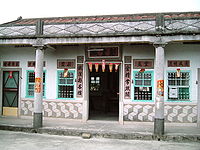- Chinese clan
-
Chinese clan Chinese 宗族 Transcriptions Mandarin - Hanyu Pinyin zōngzú Min - Hokkien POJ chong-cho̍k Cantonese (Yue) - Jyutping zung1 zuk6 Alternative Chinese name Chinese 家族 Transcriptions Mandarin - Hanyu Pinyin jia1 zu2 Min - Hokkien POJ ka-cho̍k Cantonese (Yue) - Jyutping gaa1 zuk6 A Chinese clan is a patrilineal and patrilocal group of related Chinese people with a common surname sharing a common ancestor and, in many cases, an ancestral home.
Contents
Description
Clan loyalties tend to be strong in southern China, reinforced by ties to an ancestral village, common property, and often a common spoken Chinese dialect unintelligible to people outside the village. Clan structures tend to be weaker in northern China, with clan members that do not usually reside in the same village nor share property.
Variations
Tang hao
A Tang hao (堂號) is usually an ancestral hall used to group people belonging within the same family names. Usually a temple or church is established as the ancestry place.[1]
Consort clan
In Imperial times, a consort clan was a clan with special status due to its connection with an Emperor. Throughout Chinese history consort clans have exercised great power at various times. There have been several usurptions of power by consort clans, the most notable being the Han Dynasty's Empress Dowager Lü (Chinese: 呂太后; pinyin: Lǚ Tàihòu), the Tang Dynasty's Empress Wu (simplified Chinese: 武则天; traditional Chinese: 武則天; pinyin: Wǔ Zétiān), and the Qing Dynasty's Empress Dowager Cixi (Chinese: 慈禧太后; pinyin: Cíxǐ tàihòu). The Han Dynasty usurper Wang Mang was a relative of the Grand Empress Dowager Wang.
During the Qing dynasty, the Imperial government encouraged Chinese clans to take up some quasi-governmental functions such as those involved social welfare and primary education.
See also
External links
References
- ^ Bureau of Cultural Affairs Kaohsiung City gov. "Khcc.gov.tw." Taiwan Tonghou info. Retrieved on 2009-10-28.
Categories:- Chinese culture
- History of China
- Clans by nation
- China stubs
Wikimedia Foundation. 2010.

